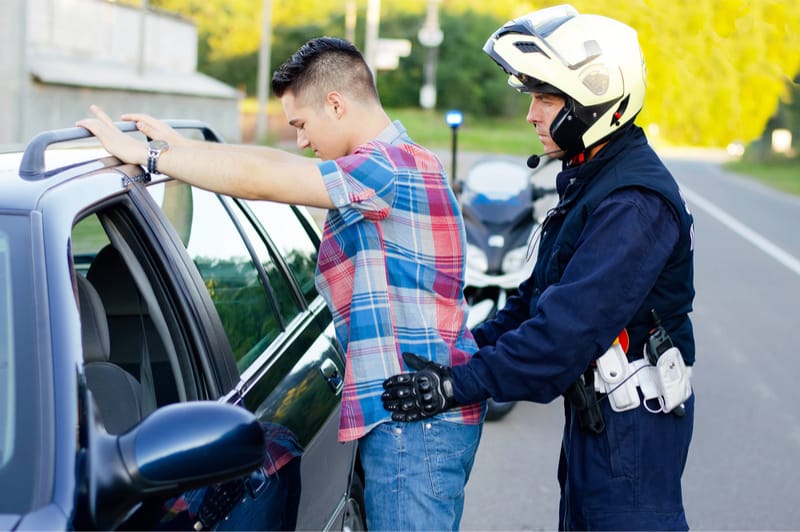Can Police Search Your Car Without a Warrant?
Can Police Search Your Car Without a Warrant?
Stops, searches, and seizures are often critical to criminal prosecution–and when they’re carried out illegally, critical to a strong legal defense.
The Fourth Amendment protects Americans from unreasonable searches and seizures. This is a fundamental right that applies everywhere, from the privacy of your bedroom to public roads and streets.
Keep reading to learn about your rights and the limits of police powers during a traffic stop.
Don’t Say Yes To A Search!
Under certain circumstances, police can search a vehicle without a warrant. But in many more cases, citizens actually incriminate themselves by consenting to a police search in situations where the officers lacked probable cause for a warrantless search.
These requests will often be crafted to sound like a command, often a variation on “Do you mind if I take a look in your car?”. Know your rights, and refuse any searches respectfully but clearly. Even if you have committed no crime, police will look for any evidence they can to incriminate you. Officers will often try to guilt you into permitting a search, with lines like “What do you have to hide?” Don’t fall for this trick.
Police would like to think they have an instinct for spotting criminals. But intuition is not a valid reason to infringe on a citizen’s civil rights. And more often than not, intuition is really just a softer way for police to say they were racially profiling the suspect. The latest research from the Stanford Computational Policy lab has documented a meaningful decrease in racial disparities during night-time policing when it is too dark to visibly determine a suspect’s race before making the stop.
Police may aggressively push for you to agree to a full vehicle search even if they can’t see or smell anything illegal during a traffic stop. In some cases, officers will actually respect a verbal refusal to search. In other cases they might proceed anyway–but your verbal refusal to consent to the search could be a powerful tool in your defense attorney’s approach if police find anything incriminating in their search.
Why Can Police Search Without a Warrant?
Before the American Revolution, British officials would often raid the homes of suspected patriots on general warrants or with none at all, searching for some evidence of disloyalty or tax evasion. These abuses were so bad that the King’s “swarms of officers” were listed as one of the abuses on the Declaration of Independence, and the Bill of Rights specifically limited searches to specific warrants issued on probable cause.
When Prohibition was enacted in 1920, Federal agents were authorized to stop and search vehicles suspected of carrying liquor without a warrant. Bootlegger George Caroll was arrested after such a warrantless search and charged with transporting alcohol in violation of the Volstead Act.
He challenged the legality of the search; the appeal eventually made it to the Supreme Court. The court found that people had a reduced expectation of privacy when driving or riding in a car. People can still expect some privacy on the road, but a car should not have the legal privacy protections of a home or apartment.
It also found that since cars can easily move between jurisdictions, the normal search warrant process would be ineffective for common automobile searches. By the time a judge granted a warrant, the car could easily be several states away.
Since then, police have been able to search vehicles on the roadside without getting a warrant. However, this is a limited power, and can only be done when the driver’s actions have created probable cause that contraband or dangerous weapons are concealed in the vehicle.
Normally, police must present their reasoning to a judge, who weighs the evidence and decides to issue or deny a search warrant.
Traffic stops force officers trained to enforce the law to play the role of a judge–two very different skill sets. It is not surprising then that officers often make bad calls and perform unconstitutional vehicle searches.
Can Police Search Your Car After A Speeding Stop?
Minor traffic violations like speeding do not give police a reason to search your car. However, while writing the ticket, police might see something that appears to be contraband in the passenger compartment.
If you roll down your window after a speeding stop and the officer sees drugs or weapons in the passenger compartment, the officer can search the passenger compartment on the spot without a warrant. Police officers might ask for permission to search your car even if the standards for a warrantless search are not met. If you consent, they can still use this evidence against you.
Can Police Search Your Car After An Arrest?
Another exception to the need for a warrant is a search incident to an arrest. After arresting a suspect, police may search his or her person for weapons or contraband. In certain cases, they may also search the suspect’s vehicle.
This authority is limited, and may only be exercised if it is reasonable to believe that evidence of the offense of the arrest may be found in the vehicle. A general search of the vehicle is not permitted when the offense does not lend itself to evidence being hidden in a vehicle. In the precedent-setting case Arizona v. Gant, the Supreme Court found that an arrest for driving on a suspended license did not justify a general search of the car.
Were You the Victim of an Unconstitutional Search?
When police seize incriminating evidence in the course of an unconstitutional search, a good criminal defense lawyer can often invoke the exclusionary rule and have that evidence suppressed. If you are facing criminal charges stemming from an unconstitutional search in South Jersey, call Aita Law LLC to schedule a consultation at (856) 287-7800.

